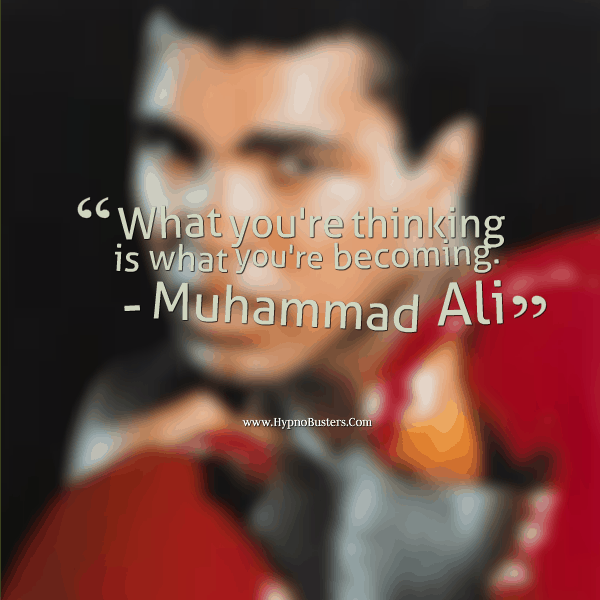
Jon Rhodes
 If you are interested in the psychology of success then Muhammad Ali is well worth studying.
If you are interested in the psychology of success then Muhammad Ali is well worth studying.
As well as being a clinical hypnotherapist and musician, I’m also a boxing fan.
To be a good boxer you must be strong, fast, fit, brave, and have a tough mentality. Any weakness is exploited. You need many positive attributes to be competitive. And they all begin with your mind.
When I was a teenager I bought mountains of boxing videos to watch old fight footage. I stumbled upon Muhammad Ali, who I’d never seen before. I enjoyed watching this brash young fighter who was as quick with his mouth as he was with his hands. A fighter who could talk a great fight, but importantly could back it up with his fists. I loved his style, both in and out of the ring, and became a fan, buying more archive videos of him.
Self Hypnosis
I didn’t realise at the time, but Muhammad Ali was great at self hypnosis. He used many positive affirmations towards himself, and negative ones towards his opponents. He particularly boasted about being ‘the greatest’, would often correctly predict what round he would win a fight in, and would always look to gain a psychological advantage.
 He even devised metaphors about himself such as “Float like a butterfly, sting like a bee.” and “I’m so fast that last night I turned off the light switch in my hotel room and was in bed before the room was dark.” These colourful quotes are easily absorbed by an opponents unconscious mind, causing them to over estimate how good Ali was. He could make them doubt themselves before stepping into the ring.
He even devised metaphors about himself such as “Float like a butterfly, sting like a bee.” and “I’m so fast that last night I turned off the light switch in my hotel room and was in bed before the room was dark.” These colourful quotes are easily absorbed by an opponents unconscious mind, causing them to over estimate how good Ali was. He could make them doubt themselves before stepping into the ring.
Ali fully understood the importance of positive self affirmations. He once commented that “At home I am a nice guy: but I don’t want the world to know. Humble people, I’ve found, don’t get very far.”
“It’s the repetition of affirmations that leads to belief. And once that belief becomes a deep conviction, things begin to happen.”
Grab The Bull By The Horns
When Ali first challenged for the world title at the young age of 22, he was up against the mighty Charles ‘Sonny’ Liston. With an immensely powerful punch, Liston was regarded as one of the greatest heavyweights in boxing history. Although Ali boasted an impressive unbeaten record, no one realistically gave him a chance.
Instead of freezing like a rabbit like many of Liston’s previous opponents, the young Ali confronted Liston at the weigh in before the fight. He acted like a crazy man, calling Liston ‘an ugly bear’. He even arranged with his assistant trainer Drew Bundini Brown to ‘hold him back’ and pretended he wanted to fight there and then.
Although Liston was a fearless warrior, he had never encountered anyone ‘crazy’ before. He didn’t know what to make of this young fighter. This was new to him, and unsettled him before the fight. Needless to say, against all expectations there was a new champion at the end of the fight.
Psychological Tactics
A regular tactic of Ali was to insult and wind up his opponents before, and sometimes during a fight. This made them angry and tense, which wasted their energy, and made them forget their fight strategy.
Ali did this throughout his long boxing career. Even as a 12 years old amateur, Ali would poke his head inside his opponent’s locker room asking, ‘Which one of you is the guy I’m beating up tonight?’
According to Lynne McTaggart in her book “The Intention Experiment”, Muhammad Ali would often rehearse his fights in his head as if they were real. Before one of his fights with Joe Frazier he imagined “the fatigue in his legs, the sweat pouring off his body, the pain in his kidneys and bruises on his face, the flash of photographers, the exultant screams of the crowd, even the moment when the referee lifts his arm in victory…” This classic technique of visualising success is used often in hypnosis. If you want to be a great football player, then visualize yourself excelling at the highest level.
Ali would say himself that “Champions aren’t made in gyms. Champions are made from something they have deep inside them: A desire, a dream, a vision.”
This tally’s with what Napoleon Hill taught, and can be used for success in any venture. Find out exactly what you want (in Ali’s case it was to be the greatest boxer ever), and spend your energy focusing on that positive thing that you want. If Ali kept talking about not wanting to be the worst boxer, it wouldn’t have inspired him at all.
“Impossible is just a big word thrown around by small men who find it easier to live in the world they’ve been given than to explore the power they have to change it. Impossible is not a fact. It’s an opinion. Impossible is not a declaration. It’s a dare. Impossible is potential. Impossible is temporary. Impossible is nothing.”
Ali refused to lie down, in every sense. He was known to have a chin made of stone, and took shots off some of the hardest punches to ever grace the sport. Ali, later in his career, encouraged the hard hitting young George Foreman to repeatedly punch him in order to tire him out. Ali the older of the two men won by shear desire and determination. He was not as young or big and strong as the champion Foreman, but he found a way to win. He convinced himself through repetition that he was the greatest, so his mind and body refused to give in, and he found a way to succeed.
Out of the ring Ali was equally as determined. He refused to fight in the Vietnam war because he didn’t believe it was right. He went to prison for a short time, and was not allowed to box for 4 years. He made up his mind and stood by his decision firmly, regardless of the consequences.
Final Thoughts
This strength of mind is what helped bring Muhammad Ali success both as a boxer and a human being. Ali seemed more aware than most that he must use his mind in a certain way if he was to be a success. He literally thought his way to success using various hypnotic and psychological techniques that he intuitively knew.
Ali talked the talk, but he also walked the walk. His repeated use of positive affirmations and visualisation helped him achieve ‘greatness’, and inspire millions around the world. And he continues to inspire millions to this very day.
Ali shows that you CAN think your way to success. You just need the right mindset…


So sorry to hear of his passing. A true inspiration to sport and humanity.